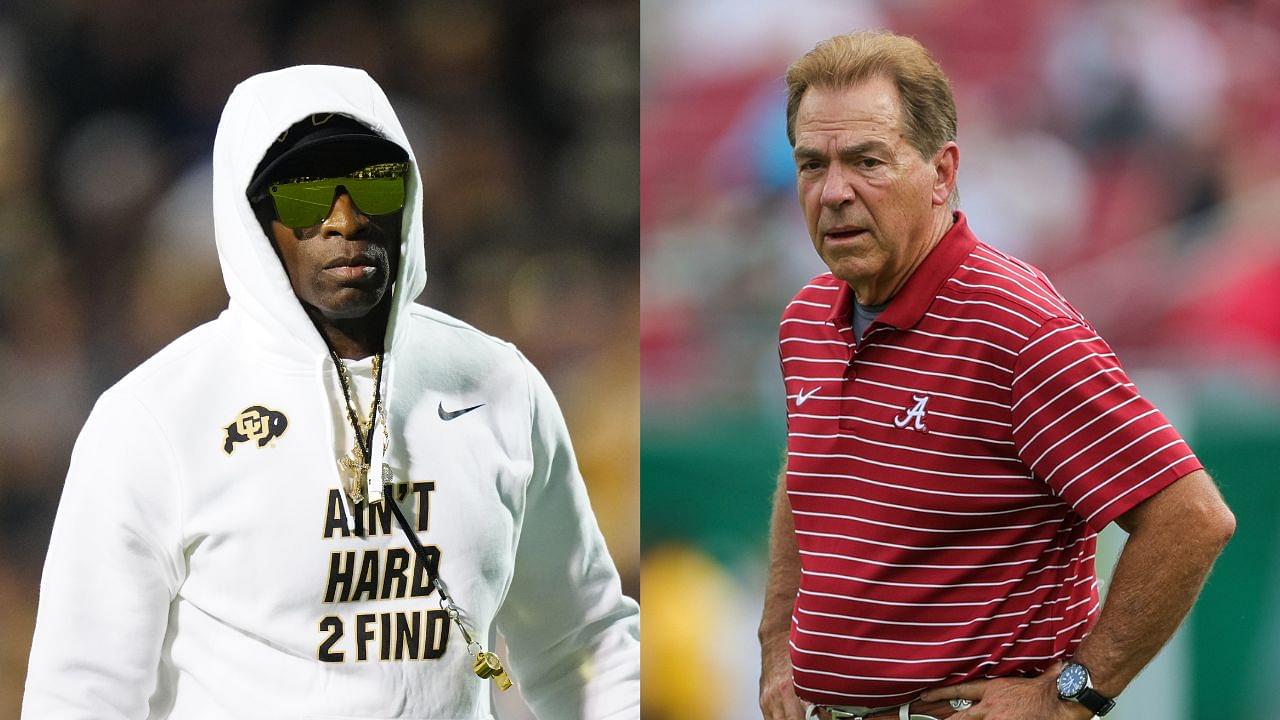In his second offseason as a Division I coach, Deion Sanders’ approach to the NIL (Name, Image, and Likeness) and transfer portal has sparked considerable debate. Highly criticized by some, Sanders’ out-of-the-box approach might actually have found a supporter in Alabama legend Nick Saban.
Advertisement
Known for his unconventional methods, Sanders has dealt with these new rules with practicality, utilizing them to his advantage. Saban, who seemingly retired from NCAA coaching due to the impact of these new regulations on his traditional coaching style, has lent credence to Sanders’ ways.
The former head coach’s recent comments on the changing landscape, particularly regarding the NIL and transfer portal, have been enlightening. While he bemoaned the changing landscape of college football as he was bidding goodbye to the sport he had dedicated his life to, Saban has now acknowledged the need for coaches to adapt to the new realities of the sport. A clip from CBS Sports captured Saban, who led Alabama to numerous national championships, saying,
“Every coach should be looking forward and not backward in terms of ‘we’ve always done it this way.’ Well, you can’t do it that way anymore…Being adaptable to the circumstances you are in so that you have a chance to be functionally successful with the opposition who are potentially adapting [is crucial],” said Saban in his latest address.
View this post on Instagram
Deion Sanders has arguably been the front-runner in adapting to the evolving landscape to the best of his abilities, from utilizing the transfer portal to build his dream team to embracing NIL to empower his players.
Arguably, the implementation of NIL in 2021 revolutionized college athletics by allowing athletes to earn money from sponsorship deals and the use of their likenesses. This shift not only provided financial opportunities for players but also challenged the NCAA’s long-standing model.
Athletes now receive compensation, which helps them prepare better for future professional careers. Though the concept has had its fair share of controversies, Deion Sanders has supported it throughout while advocating the need to help new athletes manage their money better. And for Sanders, overall growth is important, which has caused him to adjust his program to suit the NIL landscape.
Deion Sanders Puts NIL and Transfer Portal to Good Use (Again)
Deion Sanders, who took over as head coach of the Colorado Buffaloes, has made necessary adjustments to market his program effectively and maximize the benefits these new rules offer.
Last year he overhauled his roster with the transfers, similar to his approach this year. His understanding of the potential of NIL stems from his own experiences as a Hall of Fame cornerback who was ahead of his time in marketing himself. Reflecting on his college years, Sanders pondered how different his life might have been with the financial opportunities NIL now provides.
https://twitter.com/Street_Gamez22/status/1742610068112027758
The transfer portal has undergone another major change in college football. However, it has also been a path of exploration for Deion Sanders. As a former star athlete, he believes that overcoming adversity can be beneficial for a player’s career. He also values the traditional notion of “paying your dues”.
However, as a coach, he appreciates the portal’s ability to bring immediate reinforcements to his team, allowing him to adjust and improve rapidly.
Despite the benefits of NIL and the transfer portal, Deion Sanders has criticized their potential misuse, particularly in recruiting. He has expressed his preference for attracting players who are committed to personal and athletic development over those who are only interested in financial gains.
Meanwhile, Nick Saban’s vote for Deion Sanders’ adaptive approach highlights a broader acceptance among veteran coaches. The shift towards embracing NIL deals and the transfer portal is seen not just as a necessity but can help in gaining strategic advantage if used with caution and care.







